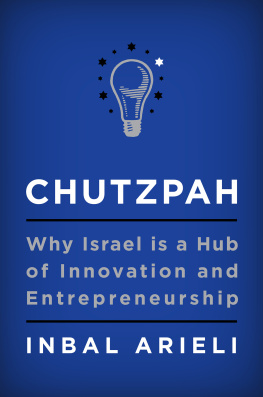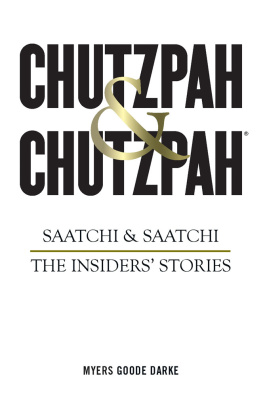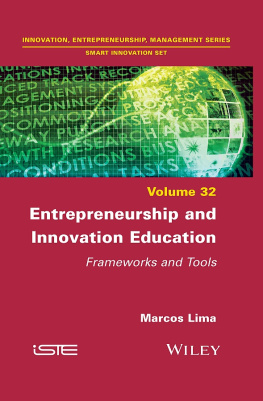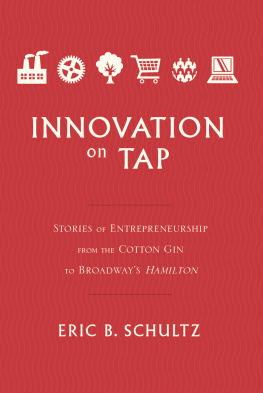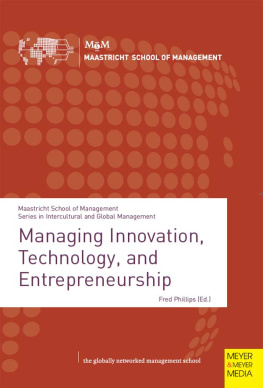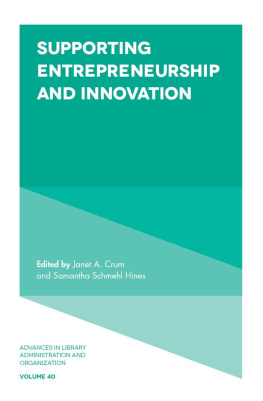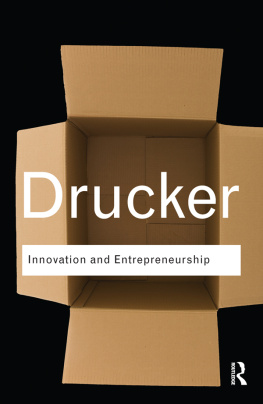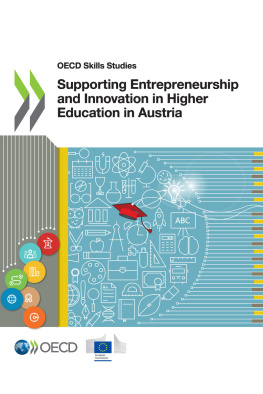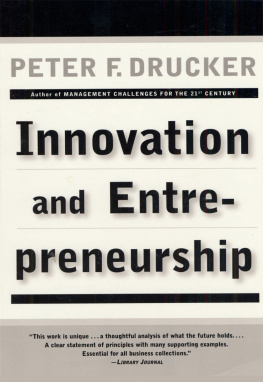Inbal Arieli - Chutzpah Why Israel is a Hub of Innovation and Entrepreneurship
Here you can read online Inbal Arieli - Chutzpah Why Israel is a Hub of Innovation and Entrepreneurship full text of the book (entire story) in english for free. Download pdf and epub, get meaning, cover and reviews about this ebook. year: 2019, publisher: HarperCollins, genre: Home and family. Description of the work, (preface) as well as reviews are available. Best literature library LitArk.com created for fans of good reading and offers a wide selection of genres:
Romance novel
Science fiction
Adventure
Detective
Science
History
Home and family
Prose
Art
Politics
Computer
Non-fiction
Religion
Business
Children
Humor
Choose a favorite category and find really read worthwhile books. Enjoy immersion in the world of imagination, feel the emotions of the characters or learn something new for yourself, make an fascinating discovery.
- Book:Chutzpah Why Israel is a Hub of Innovation and Entrepreneurship
- Author:
- Publisher:HarperCollins
- Genre:
- Year:2019
- Rating:3 / 5
- Favourites:Add to favourites
- Your mark:
- 60
- 1
- 2
- 3
- 4
- 5
Chutzpah Why Israel is a Hub of Innovation and Entrepreneurship: summary, description and annotation
We offer to read an annotation, description, summary or preface (depends on what the author of the book "Chutzpah Why Israel is a Hub of Innovation and Entrepreneurship" wrote himself). If you haven't found the necessary information about the book — write in the comments, we will try to find it.
Inbal Arieli: author's other books
Who wrote Chutzpah Why Israel is a Hub of Innovation and Entrepreneurship? Find out the surname, the name of the author of the book and a list of all author's works by series.
Chutzpah Why Israel is a Hub of Innovation and Entrepreneurship — read online for free the complete book (whole text) full work
Below is the text of the book, divided by pages. System saving the place of the last page read, allows you to conveniently read the book "Chutzpah Why Israel is a Hub of Innovation and Entrepreneurship" online for free, without having to search again every time where you left off. Put a bookmark, and you can go to the page where you finished reading at any time.
Font size:
Interval:
Bookmark:
To my loved sons:
Yonatan, Daniel, and Yarden
Children must be taught how to think, not what to think.
Margaret Mead
Its impossible!
Most people would give up when theyre told something is impossible to achieve. But try saying Its impossible to an Israeli. The result would be an excited, dreamy, motivated journey to achieving maybe not the original goal, but something close enough. Probably better than initially envisioned.
At the root of this approach is the Israeli chutzpah, a determined approach to life, which might seem to some as rude and opinionated, or, to others, seen in a more positive light, as preferring directness to political correctness for the sake of achieving ones goals. With the right amount of chutzpah, anything is possible. Whether you are a seven-year-old kid insisting on speaking out at a family dinner or an experienced business executive proposing a creative solution to a commercial transaction, you are instilled with the chutzpah powerdetermined, courageous, and optimistic that anything can be achieved.
This spice of chutzpah is manifested across the board, in all aspects of Israeli life. Its also an essential part of the success of Israel as a tech nation. You may have heard someone call Israel the Start-Up Nation. Its a moniker that fits: Israel has the highest density of start-ups in the world and is ranked first outside of the United States as a global hub of entrepreneurship.
People ask me all the time: What makes Israel such a cradle of innovation? or Why are Israelis constantly busy with new initiatives? Ive heard many different explanations, ranging from the influence of Israels technologically advanced military to the effect of the long-standing Jewish traditions of study and questioning. Those explanations, while not without merit, are too narrow. What Ive come to understand is that it is the unique way Israelis are brought up, within a tribe-like community and with a childhood full of challenges and risks, that is at the root of Israelis entrepreneurial culture. That, and a lot of chutzpah we all share.
For the last twenty years I have been immersed in the Israeli entrepreneurial ecosystem and have been gathering insights, data, and stories. I have spent my career working with serial entrepreneurs and nurturing some of the most talented Israeli youth. I did this during my service in the Israel Defense Forces elite Unit 8200; through running accelerators and tech talent incubators; while taking on senior leadership roles in global technology companies; by becoming an entrepreneur myself; and by being a mom to three curious boys.
Over the years, I have observed the roots of Israeli entrepreneurship deepen and identified the key factors necessary for this process. All these experiences have solidified my conviction that innovation and entrepreneurship do not originate in one magical moment, nor are they the province of a select few born with an innovative gene, but rather they are a product of a specific set of skills, ideally nurtured from a very young age.
Granted, Im an Israeli mother, so perhaps I am a bit biased, but I think the answer to why Israel is such a laboratory of innovation and entrepreneurship begins with the way Israelis raise their children.
From the moment they can raise their heads, we encourage our sons and daughters to explore the world around them, freely and without fear or constraint, which is much easier said than done! I realized when I had my first son, Yonatan, that while I couldnt expect not to worry about him, what I could do was not pass that anxiety and fear onto my son. What made the decision easier was that I had many moms around me who made the same choice. We saw our role as not just keeping our kids safe or teaching them what we knew, but also fostering in them real independence.
Giving my son that gift meant knowing how to get out of his way, letting him fall and explore even where it wasnt totally safe, and, when he was ready, helping him process and make meaning of his experiences. What Im describing is not conditional independence; it is absolute, and it is difficult.
This freedom extends and grows as our kids age; it is embedded in our institutions and in our culture. As Ill show in the coming pages, Israel is not a very risk-averse society; our willingness to make mistakes and, even more important, allow our children to, builds resiliency and creativity, and eventually amazing inventions.
Warren Buffett once said: If youre going to the Middle East to look for oil, you can skip Israel. If youre looking for brains, look no further. Israel has shown that it has a disproportionate amount of brains and energy.
Today, Israel has the highest concentration of start-ups per capita worldwide, with more than one start-up for every two thousand people. Which means that Israel, with a population of just over eight million citizens, a country roughly half the size of Lake Michigan, is home to more than five thousand Israeli start-ups, alongside an additional thousand mature tech companies.
Israel is ranked third out of 138 countries in the World Economic Forum Innovation Rating, boasting a long list of innovations: from cherry tomatoes to drip irrigation; from the first capsule endoscopy solution to the first software for online chat; from the USB flash drive to Waze, a GPS-based geographical navigation application program for smartphones. And so many more.
Israel has the globes highest R&D expenditure in terms of percentage of GDP and leads the OECD in the number of scientists and researchers per number of employees. Since 1966, twelve Israelis have been awarded Nobel Prizes in an array of fields including chemistry, economics, literature, and peace. A unique example is Professor Ada Yonath of the Weizmann Institute of Science, who was awarded the 2009 Nobel Prize in Chemistry, along with her colleagues Venkatraman Ramakrishnan and Thomas Steitz, for their groundbreaking work on the protein-producing part of the cell known as the ribosome, which led to treatments for leukemia, glaucoma, and HIV, as well as antidepressant medications. Professor Yonath was the first female Israeli Nobel laureate, the first woman from the Middle East to win in a scientific field, and the first woman in forty-five years to win the prize for chemistry.
This tiny countrys inventory of achievements in the tech and entrepreneurship space, within but a few decades, is long and impressive. Israel attracts more venture capital per capita than any other country in the world, surpassing the United States, Canada, and European strongholds. Despite the challenging geopolitical environment, confidence among investors vis--vis Israeli high-tech companies is extremely high, second only to the United States; to date, there are more than one hundred venture capital and private equity firms operating in Israel and actively investing in Israeli companies. Eighty-five percent of these investments come from abroadmostly the United States but with growing representation from Asian investors. And as of 2018, Israel has the highest representation of companies listed on Nasdaq, following only the global giants of the United States and China. It also hosts more than three hundred multinationalsfrom Apple to Intel, Facebook and Google, Dropbox and PayPalwho have opened R&D offices in Israel and are leveraging local talent.
These accomplishments have positioned Israelits tech innovation and entrepreneurial ecosystemas the leading innovation hub outside of the United States, and, as a result, it has been dubbed the Start-Up Nation and Silicon Vadi.
As a robust economic center for innovation and entrepreneurship, Israel also has been ranked sixth out of fifty countries in the Family Life Index, which measures factors such as access to affordable and quality education, leisure activities, and family well-being. A final, fun figure: Israel has more museums per capita than any other country in the world.
Font size:
Interval:
Bookmark:
Similar books «Chutzpah Why Israel is a Hub of Innovation and Entrepreneurship»
Look at similar books to Chutzpah Why Israel is a Hub of Innovation and Entrepreneurship. We have selected literature similar in name and meaning in the hope of providing readers with more options to find new, interesting, not yet read works.
Discussion, reviews of the book Chutzpah Why Israel is a Hub of Innovation and Entrepreneurship and just readers' own opinions. Leave your comments, write what you think about the work, its meaning or the main characters. Specify what exactly you liked and what you didn't like, and why you think so.

